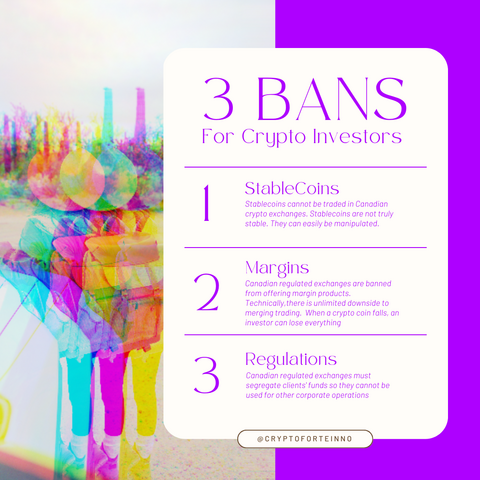Canada bans trading of crypto on margin and stablecoins. Regulator moved very swiftly; two months after the FTX implosion to protect Canadians from losing all or most of their life's savings.
Key Takeaways
- Stablecoins are banned from trading unless it's approved by the Canadian Securities Administrators (CSA)
- Crypto margin is banned
- Crypto Centralized Exchanges (CX) must be registered with the OSC
| 2024 Update: Stablecoins trading in Canadian crypto platforms must obtain pre-approval. Subject to:
|
Canadian regulators are moving quickly to protect crypto investors’ savings in the wake of the FTX and Luna/Terra collapse in 2022 where many vulnerable investors have lost their life’s savings. Shame on scammers who prey on those who are retired and vulnerable and stealing their life’s savings.
To reduce the attack surface, Crypto trading platforms have 30 days to assure regulators they’re following some specific rules in order to keep serving Canadian clients. Among the rules are:
- segregated the firm’s own funds
- ban on offering margin trading or other forms of debt.
- Firms are also not allowed to offer stablecoins unless they get specific permission from regulators.

If a crypto trading platform doesn’t provide an official “pre-registration undertaking” to follow the rules within 30 days, they’re expected to wind up their Canadian clients’ accounts, and block Canadians from accessing their services.
Canadians looking to get on crypto, it is advised that they use ONLY registered platforms. Here are the ones that are safe, as of this article’s publication:
- Bitbuy Technologies Inc. (Bitbuy)
- Coinberry Limited (Coinberry)
- Coinsquare Capital Markets Ltd.
- Fidelity Clearing Canada ULC (Fidelity Digital Assets)
- Fidelity Digital Asset Services, LLC
- Netcoins Inc. (Netcoins)
- Newton Crypto Ltd.
- Simply Digital Technologies Inc. (carrying on business as CoinSmart)
- VirgoCX
- Wealthsimple Digital Assets Inc. (Wealthsimple)
“These are time-honoured principles of securities regulation, so if a registered investment dealer … is going to hold customer assets, they have to safeguard them with appropriate controls and act like they’re customers’ property and not their own,” said Grant Vingoe, Ontario Securities Commission CEO. “Investors who are using the services of these platforms are entitled to know that if something goes wrong, they can get their assets back and that those assets … aren’t going to be lost in a bankruptcy proceeding.”
Vingoe said the new rules on stablecoins are needed because they’re not as stable in value as advertised and there’s often a lack of transparency over exactly how they’re issued and run. Vingoe is right. We have learned the hard way about the collapse of the Luna-Terra collapse.
We also have the following articles that might be helpful:
The basic idea is that those who wrote the code, run the risk of having all kinds of backdoors. The backdoor gives the founder and original developers the ability to:
- Devalue existing coins by minting new coins;
- Inflate demand when there wasn’t any to start with;
- Founders and initial investors may flee; leaving investors holding worthless coins;
- Vulnerable for bait and cash out schemes;
- Ponzi Schemes with high staking (aka. Interest) rewards with nothing to backup
Risks of Using Crypto Exchanges That are Out of Reach of Regulators
Binance is banned from Canada. However, many Canadians still do business with them. The risk is that it will be hard to convert they money back into FIAT (i.e., Canadian Dollars).
When the exchange lacks transparency, and is running from regulators, there is a high risk, that the exchange will implode like FTX – large or small. The largest exchange in the world, Binance, is certainly still in business. However, its lack of transparency and regulatory oversight makes it very risky to do business with.
The risks of Using Unregulated Exchanges
An unregulated exchange, and if it mints its own crypto coins, there is a very high probability that it will take your deposits and use them for
- general corporate use,
- make political donations,
- pay extravagant salaries to its founders, and employees.
The company many not have sufficient and robust internal controls because they may not even have any accounting software. FTX ran on QuickBooks Online; large companies which are worth billions of dollars and hold their customers’ deposit run on robust ERP and accounting software solutions – not QuickBooks Online.
Make sure you do your homework. Do not blindly follow how others have become rich for they have already cashed out before you jumped onboard.
Source:





